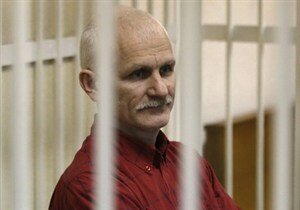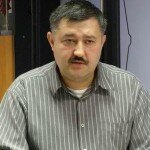
Ales Bialiatski is a Belarusian political activist known for his work for the Viasna Human Rights Centre, of which he is currently the head. He is the vice president of the International Federation for Human Rights (FIDH). Bialiatski has received the Homo Homini Award and the Per Anger Prize for his efforts in promoting human rights and democracy, he was three times nominated to the Nobel Peace Prize. He was arrested by the Belarusian authorities on tax evasion charges in 2011.
Ales Bialiatski was born on 25 September 1962 in the village Viartsilia, in the region of Karelia, Russia, to Belarusian parents. He was the first child of his parents. They gave him the name after the maternal grandfather, who was killed during the war. In 1964, the family was able to return to Belarus due to the demand for workers for emerging industries. Bialiatski’s family decided to move to Svietlahorsk.
He is a scholar of Belarusian literature, he graduated from the Francishak Skaryna Homiel State University. During his studies, he began to fluently speak Belarusian. In 1981, he became the first student at the faculty, who used this language on a daily basis. In years 1984-1989, with a break to serve in the Soviet Army, he did postgraduate studies at the Institute of Literature of the Academy of Sciences of the Belarusian SSR. He worked as a teacher. In 1989, he worked in the Museum of the History of the Belarusian literature. In the years 1989-1998 he worked as the director of the Maxim Bahdanovich Literary Museum.
In the 1980s, he also became actively involved in anti-Soviet protests. One notable event he helped to organize was a memorial ceremony at Kurapaty, the site of thousands of killings by the NKVD in the late 1930s. During this period, the KGB attempted to recruit him, but at the first meeting Bialiatski refused to continue any contact with the institution.
He signed letters to the Minsk City Council of Deputies, asking for permission to organize demonstrations “the Forefathers’ Eve-87” and “the Forefathers’ Eve-88”, which aim was to express opposition to totalitarianism and Stalinism. For participation in the “Forefathers’ Eve-88” he was arrested and fined. He was a co-founder of the Belarusian Social and Educational Historical Society “Martyrałoh Belarusi.” Bialiatski was also one of the founding members of the Belarusian Popular Front. In 1990, he was one of the founders of the Belarusian Catholic Hramada. In 1992-1996 he was a deputy to the Minsk City Council of Deputies. He is a member of the Belarusian Writers Union, and helped to found the Tutejshyja Association of Young Writers, serving as the group’s chairman from 1986 to 1989.
Bialiatski founded the Viasna Human Rights Centre in 1996. The Minsk-based organization provides financial and legal assistance to political prisoners and their families. From 30 October 1999, he was a deputy chairman of the Belarusian Popular Front “Revival”. In June 2000, he was elected head of the Working Group of the Democratic NGOs Association. From 2007 he is a Vice-President of the International Federation for Human Rights.
In 2012, Ales Bialiatski together with the Uganda’s Civil Society Coalition on Human Rights and Constitutional Law became the winner of the 2011 Human Rights Defenders Award awarded by the US Department of State. Ales Bialiatski was awarded the prize in absentia, the award was passed to his wife Natalia Pinchuk in the US Embassy in Warsaw, Poland, on 25 September 2012.
He was nominated to the Nobel Peace Prize three times, in 2006, 2007 and after his arrest in 2011.
Chronicle of repression
Ales Bialiatski was repeatedly held liable criminally – up to the end of the 90s more than 20 times. According to the Belarusian independent media every time it was politically motivated persecution. In early 2011, the newspaper Sovetskaia Biełorussija, belonging to the Belarusian authorities, published a series of highly critical articles about opposition politicians, including Bialiatski
On 4 August 2011 Ales Bialiatski was arrested under charges of tax evasion (concealment of income on a large scale; the art. 243, part 2 of the Criminal Code of the Republic of Belarus). A violation of this article is punishable by up to 7 years of imprisonment and the confiscation of property. The indictment was made possible by financial records released by prosecutors in Lithuania and Poland. Radoslaw Sikorski, Poland’s Foreign Minister, subsequently apologized for the “reprehensible mistake,” and Lithuania issued an apology as well.
On 24 November 2011, Bialiatski was sentenced to four and a half years in prison for “concealment of income on a large scale.”
Several international human rights non-governmental organisations called for Bialiatski’s “immediate and unconditional release,” as well as the Lithuanian Foreign Minister and President of the OSCE Audronius Ažubalis, the German Government, the High Representative for Foreign Affairs Catherine Ashton, the European Union, the Union of Belarusian Writers, the British Minister for Europe David Lidington, Amnesty International and the U.S. State Department.
On 24 December 2011, Ales’s father, Victor Bialiatski died of lung cancer. A few days earlier, the authorities refused Ales the right to meet with a dying father.
On 17 February 2012, the media reported that Bialiatski was transferred from the detention center in Zhodino to a penal colony in Bobruisk, and later, that until 28 February he was held in the Volodarka prison. Currently he serves his sentence in a penal colony in Bobruisk.
In June 2012, there were reports about the pressure that is exerted on Ales Bialiatski by the authorities of the colony. Between March and June 2012, Bialiatski received three reprimands, the authorities forbade Ales’s family to visit him. Ales Bialiatski received the status of the prisoner persistently violating prison rules, and lost his chance to be amnestied by President Lukashenko. He is still subjected to repressions and restrictive measures.
Ales Bialiatski was unexpectedly released from penal colony No. 2 in Babruisk on June 21, 2014, the day the Law “On amnesty in connection with the 70th aniversary of the liberation of Belarus from the Nazi invaders” entered into force. He spent 2 years, 10 months and 17 days in prison.




